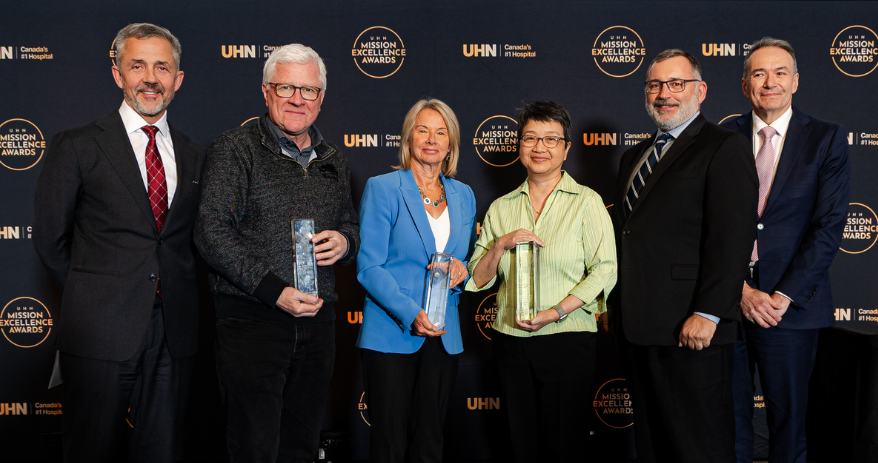AWARD ANNOUNCEMENT
SickKids’ Dr. Jayne Danska named UHN Inventor of the Year for innovation in cancer immunotherapy
The Industry Partnerships & Commercialization (IP&C) team is proud to congratulate Dr. Jayne Danska of The Hospital for Sick Children (SickKids), along with Drs. Jean Wang and John Dick of University Health Network (UHN) Princess Margaret Cancer Centre, on being named UHN’s Inventors of the Year!
UHN recognized the team’s contributions to cancer immunotherapy last week at the UHN Mission Excellence Awards. This award celebrates outstanding achievements in commercialization and partnerships that drive UHN innovations forward—Danska, a Senior Scientist in the Genetics and Genome Biology program at SickKids, is the first researcher outside of UHN to receive this honour.
The Industry Partnerships & Commercialization (IP&C) team is proud to congratulate Dr. Jayne Danska of The Hospital for Sick Children (SickKids), along with Drs. Jean Wang and John Dick of University Health Network (UHN) Princess Margaret Cancer Centre, on being named UHN’s Inventors of the Year!
UHN recognized the team’s contributions to cancer immunotherapy last week at the UHN Mission Excellence Awards. This award celebrates outstanding achievements in commercialization and partnerships that drive UHN innovations forward—Danska, a Senior Scientist in the Genetics and Genome Biology program at SickKids, is the first researcher outside of UHN to receive this honour.

(Photo courtesy of Commercialization at UHN)
In the photo from left to right: Dr. Brad Wouters, (Executive VP, UHN Research), Dr. John Dick (Senior Scientist, PM), Dr. Jayne Danska (Senior Scientist, SickKids Research Institute), Dr. Jean Wang (Clinician Scientist, PM), Mark Taylor (Director, UHN Commercialization) and Dr. Kevin Smith, (President & CEO, UHN)

(Photo courtesy of Commercialization at UHN)
In the photo from left to right: Dr. Brad Wouters, (Executive VP, UHN Research), Dr. John Dick (Senior Scientist, PM), Dr. Jayne Danska (Senior Scientist, SickKids Research Institute), Dr. Jean Wang (Clinician Scientist, PM), Mark Taylor (Director, UHN Commercialization) and Dr. Kevin Smith, (President & CEO, UHN)
Leading the fight against cancer
For decades, cancer cells have challenged the scientific community with their ability to evade both the body’s immune system and medical intervention. One of the key obstacles in developing new cancer treatments is finding a way to selectively target malignant cells without harming healthy tissue.
Danska, Wang and Dick took on this challenge through years of collaborative research. Their work focused on the CD47-SIRPα complex, a mechanism that healthy cells use to activate a “don’t eat me” signal, allowing them to inhibit macrophage activity and avoid destruction. Knowing that cancer cells exploit this pathway to escape immune detection, the team identified it as a promising therapeutic target. Through extensive research, they developed TTI-621, a molecule designed to block CD47 on cancer cells from binding with SIRPα receptors on macrophages. By disrupting the “don’t eat me” signal, TTI-621 effectively “unmasks” cancer cells, enabling the body’s immune system to recognize and eliminate them.
Recognizing the need for significant financial investment to bring this discovery closer to clinical use, the team worked with SickKids IP&C and Commercialization at UHN to license the intellectual property for TTI-621 to Trillium Therapeutics. Trillium’s mission was to advance the biologic into clinical trials, paving the way for a potential breakthrough in cancer immunotherapy. In 2021, Pfizer acquired Trillium Therapeutics in a US$2.22 billion deal, recognizing TTI-621 as a promising immune checkpoint inhibitor with the potential to treat a wide range of cancers. Today, TTI-621 (now known as Maplirpacept) is undergoing global Phase II clinical trials for the treatment of hematological malignancies, including cancers of the blood, bone marrow, and lymphatic system.
This groundbreaking work has not only opened new possibilities for cancer treatment but also underscored the critical role of translating basic scientific discoveries into life-saving therapies. IP&C proudly celebrates Danska and her team for their contributions to advancing cancer immunotherapy and for continuing to push the boundaries of innovation in the fight against cancer.
Leading the fight against cancer
For decades, cancer cells have challenged the scientific community with their ability to evade both the body’s immune system and medical intervention. One of the key obstacles in developing new cancer treatments is finding a way to selectively target malignant cells without harming healthy tissue.
Danska, Wang and Dick took on this challenge through years of collaborative research. Their work focused on the CD47-SIRPα complex, a mechanism that healthy cells use to activate a “don’t eat me” signal, allowing them to inhibit macrophage activity and avoid destruction. Knowing that cancer cells exploit this pathway to escape immune detection, the team identified it as a promising therapeutic target. Through extensive research, they developed TTI-621, a molecule designed to block CD47 on cancer cells from binding with SIRPα receptors on macrophages. By disrupting the “don’t eat me” signal, TTI-621 effectively “unmasks” cancer cells, enabling the body’s immune system to recognize and eliminate them.
Recognizing the need for significant financial investment to bring this discovery closer to clinical use, the team worked with SickKids IP&C and Commercialization at UHN to license the intellectual property for TTI-621 to Trillium Therapeutics. Trillium’s mission was to advance the biologic into clinical trials, paving the way for a potential breakthrough in cancer immunotherapy. In 2021, Pfizer acquired Trillium Therapeutics in a US$2.22 billion deal, recognizing TTI-621 as a promising immune checkpoint inhibitor with the potential to treat a wide range of cancers. Today, TTI-621 (now known as Maplirpacept) is undergoing global Phase II clinical trials for the treatment of hematological malignancies, including cancers of the blood, bone marrow, and lymphatic system.
This groundbreaking work has not only opened new possibilities for cancer treatment but also underscored the critical role of translating basic scientific discoveries into life-saving therapies. IP&C proudly celebrates Danska and her team for their contributions to advancing cancer immunotherapy and for continuing to push the boundaries of innovation in the fight against cancer.

